How these 21st-century salonnières are dismantling echo chambers and building community

It's a Wednesday evening, and instead of the million other distractions that could be occupying their time, a small group of strangers have gathered in a northern Calgary library, tugging their chairs across the carpet into small circles to … talk.
They're here for a salon — inspired by the 18th-century French gatherings of intellectuals.
This salon is being hosted by TEDx (attendees just watched a prerecorded talk and are preparing to discuss it), but there's no shortage of similar events right now for those seeking stimulating conversation.
Options range from Sidewalk Citizen's Tzavta dinners, Layla Lavan ethics nights and the Glenbow Museum's Salon Series to less strictly "salon" format events like Design Talks (d.talks) and PechaKucha.
"It's a very human thing for us to want to unpack an idea, challenge our own understanding of it," said Jonathan Perkins, co-founder of TEDx Calgary. "We don't always have the immediate circle of friends we can go to and say, 'hey, I want to spend an hour talking about [a specific topic].'"
Perkins and the other event organizers say society is feeling increasingly insular with multiple factors to blame, from social media, to political echo chambers, to urban design that doesn't support the natural growth of healthy public space.
So, the Enlightenment-era gatherings are experiencing a bit of a renaissance (pardon the pun).
"Salon culture addressed a lot of issues I felt needed to be grappled with," said Justine Kolata, founder of the Public Sphere, an organization dedicated to reviving Enlightenment salons.
She said those issues include "the lack of community life I think we're experiencing globally, loss of meaningful conversation, and in many ways I think the impoverished public sphere online where there aren't really rules of etiquette."
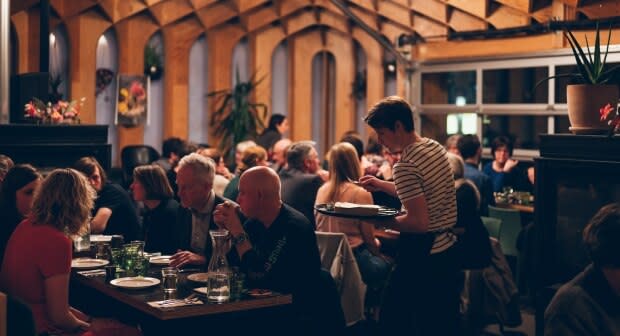
Kolata first started hosting salons in Berlin in 2014. She has since moved to London, to complete her PhD studying philosophy and salons, where she's continued to host the events. The Public Sphere's website encourages anyone around the globe to apply to become a salonnière (salon host).
There are some things a salon is, Kolata said, and some things it is not.
It's not a lecture, a panel, a debate, she said, because "at its core a salon is really just a conversation in physical space."
The space
Michal Lavi curates Tzavta — the Hebrew word for the act of sitting together, sharing food and conversing among friends. It's a monthly cultural dinner salon at Sidewalk Citizen.
"Having been out of school for a while, it seemed like a good idea to create an intellectual space that is conducive to conversation, that involves food," she said. "There's something really irreplaceable in the experience of sitting together."
Those salons were so successful she's launched Layla Lavan (Hebrew for white night) in partnership with the Calgary Institute for the Humanities. It's a series of discussions on ethics and morality. Each event runs from 10 p.m. until 2 a.m.
There will always be somebody who will look at a topic just a little bit differently. - John Albanese, host of TEDx's Crowfoot salon event
To Lavi, those details — breaking bread, chatting into the wee hours — are just as crucial for a successful salon as the guests.
She said late night is the one time of day we aren't in a hurry, so it's the perfect time to luxuriate over some ideas.
"I usually read at night and the thought of populating your night with learning seems really intriguing," she said.
"[And] there's alcohol, which I think always kind of makes things a little bit easier. So it's not formal, it's a lot more intimate, and I would say informal, so people feel a little more comfortable. It's a tight space, so you're close to other people."
Sidewalk Citizen's location in Central Memorial Park is crafted for conversation — curving plywood cradles the room, creating perfect acoustics and making visitors feel as if they're tucked inside a cozy beehive.
amery calvelli, the executive director of d.talks, has organized plenty of events in similarly architecturally pleasing spaces.
Other times, d.talks events have been hosted in landfills. One panel discussion on parking took place in a parkade.
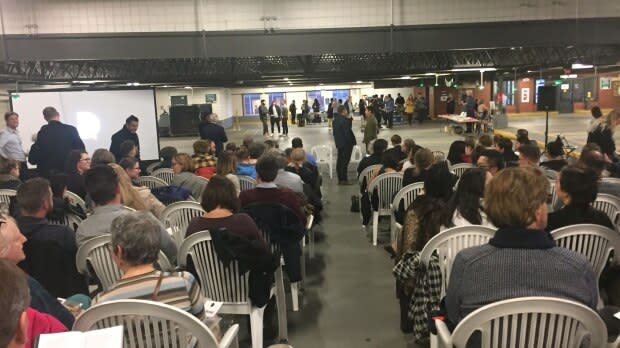
"Sometimes we'll use spaces in a particular way, whether or not it's specifically about a topic. We've often selected different kinds of spaces that might be overlooked," she said. "I think it's part of being able to look at where we are, and recognize the things that we have in the city."
The people
Kolata said that's the most important ingredient to a salon — the diverse mix of people. She said hosting them is both an art and an ongoing commitment to creating community.
"People often associate salons, when they hear the word, their automatic assumption is that it's very elitist," Kolata said.
She said it's important to understand that the original salons were "radically inclusionary" — most were run by women, and would bring together people of different religious and socioeconomic backgrounds.
I can't emphasize enough how important it is to step outside our comfort zones. - Mark Hopkins, We Should Know Each Other
Mark Hopkins likely has a better sense than most of just how interesting strangers can be.
From 2008 until 2016, he hosted gatherings he called We Should Know Each Other, inviting absolute strangers to his apartment — he's introduced thousands of people to each other this way.
"What I was doing was not particularly original or novel because, of course, like throughout history in every society people meet … but what I guess was a little distinctive was that a lot of the opportunities we have to come together as groups are around shared interests, or shared skills, which can lead to increased siloization," he said.
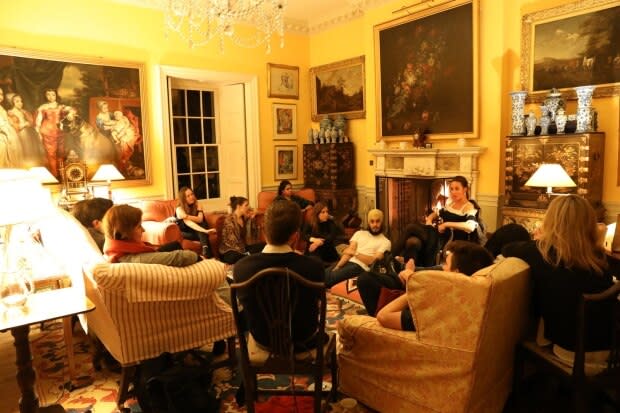
He hasn't hosted a gathering in a few years but is mulling a revival because he sees an ongoing need. He's also encouraging others to start hosting their own gatherings.
"I just had the impulse that gatherings like these needed to happen. I didn't spend a ton of time thinking about it, I just sort of whipped up an invitation, bought some snacks and hoped people would show up. I'd say that's very much worth doing," he said.
"Our whole society is set up for us to meet people that are like us … we need those structures, but there's not a lot of opportunities out there to meet people not like us. And I can't emphasize enough how important it is to step outside our comfort zones."
The connection
Jennah Turpin, the adult education co-ordinator at the Glenbow Museum who curates the museum's Salon Series, said some connections have formed so instantly it's actually presented a problem. The salon with artist Meryl McMaster was an example of that.
"She really charmed everybody … it was almost impossible to pull [guests] out of the gallery, like, we were trying to shut down. Security, you know, wanted to go home, and people were just sort of in the work. Her explaining it and her presence augmented the show for everybody that was there to a point where we literally had to kick people out," she said.
"I've seen a lot of people being able to stand around and discuss artwork, just as strangers who now have something in common."
Zoë and Steve Klintberg Nagy know first-hand how these sorts of events can spark connection.
The pair co-founded their production company, Rocket House Productions, as friends.
But through the process of hosting events like Calgary's PechaKucha nights, they fell in love and got married.
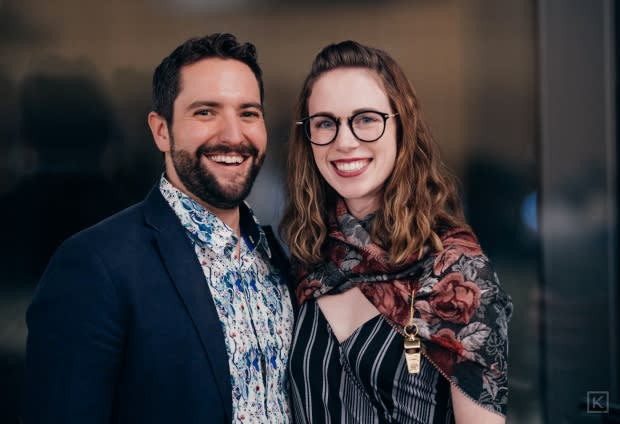
PechaKucha is Japanese for chit-chat. The storytelling events have been selling out in Calgary for more than a decade. Each event consists of rapid-fire presentations with overrun discussions spilling into the very popular mid-event beer break.
"It's incredible what projects like PechaKucha will do. It opens up conversation about things that matter, you get to ask each other questions, you know, big life questions or small life questions and just quirky little questions," Zoë said.
"It's kind of the anti-echo chamber," Steve said. "We always look for speakers with … varying viewpoints, but it's always with an eye to acceptance and an inclusive city."
Back at Wednesday's TEDx event, it didn't take long to break the ice. A man in an Oilers jersey walked in — prompting some light-hearted jokes from Flames fans already in the room.
"It's always a challenge because whenever you're facilitating a group, you have a grab bag of personalities," said John Albanese, the host of the evening's salon.
"Right now, society is a little frustrated, a little polarized … you hear about feelings, needs, thoughts, emotions just being completely disregarded at a corporate scale, a political scale, or whatever," he said.
He said the event gives people an outlet to push back against that frustration.
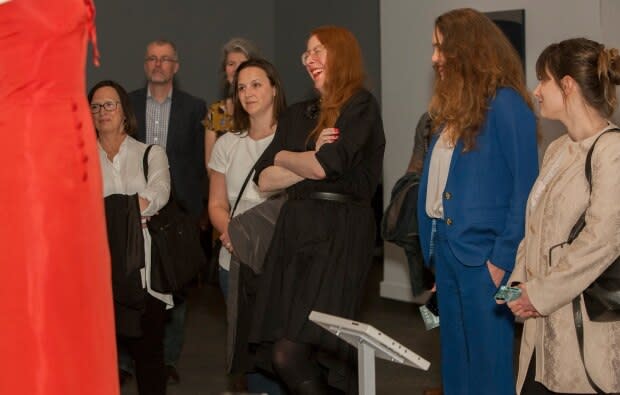
Before long, the strangers were sharing deeply personal stories, philosophical thoughts and laughs. Some exchanged numbers and hugs as the evening wrapped up.
A tired Albanese stacked chairs as attendees thanked him on their way out. He said it had been a 12-hour work day, followed by the tricky job of facilitating conversation — encouraging quieter attendees to speak up, making sure others don't overrun the conversation, and only sharing his thoughts as a catalyst for others to jump in.
"But I also feel energized," he said.
"One of the reasons I started coming to these as a participant and then became more involved is because there will always be somebody — it may not be the person I expect — but there will always be somebody who will look at a topic just a little bit differently, that will sit and fester in the back of my brain. And I find that energizing."


